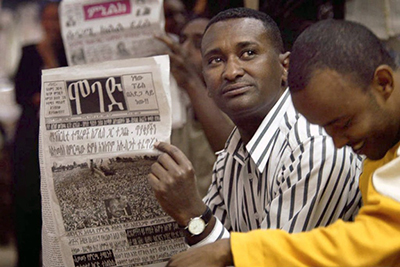In what appears to be one of a collection of measures to silence the press ahead of 2015 elections, Ethiopian authorities in the Communications Ministry are preparing a new system to control the distribution of print media. Privately owned newspapers and magazines, possibly the only remaining independent news sources in the country, would face more state control if the proposal is set into motion.
Originally proposed in February, the new measures are still at a draft stage. They aim to ensure that private newspapers and magazines are distributed through one company with links to the ruling party, according to local journalists.
The proposal, entitled “A Draft Document for Making the Print Media Accessible,” claims that supporters of the opposition are mainly in control of the current newsprint distribution system, according to the draft proposal in my possession.
Members of the media and some observers have sharply criticized the government’s move to hand over circulation to a single company. The step comes after the anti-terrorist law of 2009, which criminalized reporting on opposition groups and has intimidated many journalists into self-censorship. Since 2011, 11 journalists have been given harsh prison terms under Ethiopia’s anti-terrorism law, and five are currently serving sentences under this legislation.
While the reach of independent newspapers is negligible, with roughly 90,000 copies a week circulating in a population of 90 million, the papers are significant because there are no other independent media sources in Ethiopia. The state controls the only television station, and out of five privately-operated radio stations, three are wholly pro-government while the rest toe the state line.
“I am suspicious of this move,” said freelance journalist Betre Yacob. “These enterprises are created by the government to push their own political agendas and interests. I am sure this particular case will be similar–where the distribution company is used to ensure only positive government news is distributed.” Betre is president of the independent Ethiopian Journalists Forum, a contributor to several Ethiopian news sites, and a former political columnist for the now-defunct local magazine Ebony.
Currently, publishers of newspapers and magazines either distribute directly to retailers across the country, or contract trusted private distributors to do so for them. Under the new proposal, a company with direct government links would take copies from the printers and control distribution. Local journalists fear that the new company would block distribution if the government deems a publication too critical.
According to the draft proposal, print media suffers from the lack of a legal framework governing the current distribution system. The proposal claims most distributors do not have designated areas in which to circulate or proper identification. It also suggests that giving the distribution work to a company with some information about the media will help the industry as well as create jobs for youth.
However, independent journalists argue that the biggest challenge for Ethiopia’s media industry is not the print distribution system but government intervention and suppression of the flow of free information. “The government should take its hands off the media. Giving the distribution of newspapers and magazines to a politically motivated enterprise does not solve the problem,” Betre said. “Instead it just adds fuel to a fire.”
Another bad sign for publishers is a study conducted this year by the pro-government Ethiopian Press Agency, a state-controlled news wire, analyzing the editorial content of certain magazines. Published in February, the study claimed that seven magazines were responsible for inciting violence and terrorist acts and upholding opposition viewpoints, according to local news reports.
Local journalists working for these publications fear that the study will be used as a pretext to censor them. “Magazines are some of the few independent publications left in circulation here,” said one local journalist based in the capital, Addis Ababa, who did not wish to be identified for safety reasons. Betre concurs, saying, “The release of this research could indicate that the government is preparing to silence these magazines.”
The prohibitive cost of printing in Ethiopia also serves as a barrier to media freedom. Because of a fear of censorship from the state printer, independent publications prefer to use private printers, even though they often lack the capacity to produce sufficient copies. At times, security agents infiltrate these private printing companies, local journalists said. “It is very challenging to find a printing house willing to publish independent publications,” Betre said. “Sometimes agents warn printing houses not to print a particular publication and so they fear any association with the private press.”
These challenges, along with high taxation, are already having a detrimental effect on independent publications. While newspapers pay a reasonable publishing tax of two percent of their sales after printing each edition, annual taxes can sometimes equal a months’ total sales revenue, if not more. After six years in circulation, the local Ebony magazine closed in April due to the high annual income tax and printing costs, according to a local news report. Authorities recently demanded business income tax of 143,000 birr (US$7,300) from the independent newspaper Ethio-Midhar, an amount equivalent to their annual gross revenue, the same report said.
Unlike overt political interference such as the recent jailing of nine journalists, which has drawn a local and international outcry, these economic measures have the potential to undermine an alternative Ethiopian narrative without drawing public attention. If adopted, the new distribution system would subtly but effectively silence any critical publication ahead of May 2015 elections.
The author is an Ethiopian journalist in exile. He chooses not to be identified for his security.
